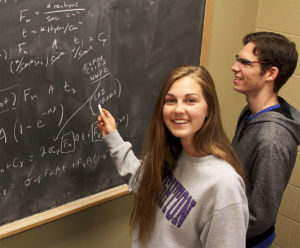Several Houghton students spent their summer working on science projects as part of Houghton College’s Summer Research Institute (SRI). During this period, students had the opportunity to learn skills and utilize technologies not common in the classroom, gain practical experience in lab research, and work in close partnership with a professor mentor. The SRI’s participants fully expect that the skills and technologies gained throughout the summer will make the students more marketable to employers.
 While the SRI is designed to be a learning experience, the projects each boast highly practical applications. Several students discussed hopes for presenting their research at conferences, or described how it already is helping a business or organization. “We started to work with a company that builds a certain kind of impeller. What I’m hoping is that our research can help them to improve their products and reduce costs,” Heather Phillips ‘18 explains.
While the SRI is designed to be a learning experience, the projects each boast highly practical applications. Several students discussed hopes for presenting their research at conferences, or described how it already is helping a business or organization. “We started to work with a company that builds a certain kind of impeller. What I’m hoping is that our research can help them to improve their products and reduce costs,” Heather Phillips ‘18 explains.
When asked about difference between Houghton’s Summer Research Institute and similar programs, Professor of Physics Kurt Aiken explains: “We have a different emphasis. Certainly, we want to help the company, want to get things done, but I also told my student that I want them to learn some things and that changes what I might make them do. Even if it’s going to take them some time to learn…I am more willing to invest that time.”
As a result, both students working on the impeller project mentioned how they walked away with greater skills in their fields. Phillips says that “Being able to understand more of the software side of the electrical engineering” will help her in the future as she works towards a master’s degree.
Some students found mostly technical value in their projects, while others gained a new sense of purpose. Jonathan Durbin ‘19 remarks, “While I don’t intend to get much more into the field of fluid dynamics, I did learn various skills that I think will help later on.” Unlike Durbin, Brielle Kwarta ‘19 claims that her research on photosynthetic allocation helped to solidify her interest in the subject, saying that “Incorporating math and biology is an area of study that I am definitely interested in pursuing. The opportunity to do research this summer confirmed my aspirations for graduate school and beyond.”
Erica Barney ‘18, who worked on monitoring biodiversity along the Pacific Crest Trail, agrees that “Being a part of this project, I have been exposed to various field research designs, methods and theories which are skills that I will use in the future to continue to ask and attempt to answer questions about the complexity of creation.”
Aikens also believes that the experience has helped his students gain a deeper appreciation for the complexity of many scientific issues. “For students I think it’s a great opportunity to apply their knowledge that they’ve learned through the school year,” he comments, “but to problems that aren’t problems that you can look up the solutions at the back of the book.”
Several students referenced their appreciation for the practical work they were able to accomplish during their research. Ben Reber ‘19 , who performed work in photosynthetic allocation, says “Especially in math, we talk a lot about math theory and numbers for numbers’ sake, and that’s all well and good, but it was kind of nice to see there are reasons we are doing math. Here’s an application that applies to the real world.”
Professor Aaron Sullivan similarly emphasizes the unique way in which students were aware of the implications of their research. “I want my students to be involved in the development of research projects so they can learn how to function as scientists rather than being plugged into a project like a cog in a wheel,” he says. “Because of that, I regularly discussed aspects of the design with them and incorporated their feedback and criticism.”
Individualized attention and one-on-one mentoring was also a highlight of the program, both for students and professors. “I was looking for one on one time with a faculty member because a lot of times in normal labs you’re in a eight to twenty other people,” Greg Ballard ‘20 says of his expectations for his summer spent researching protein misfolding.
Professors are similarly grateful for the opportunity to work closely with their students. Professor of Biology Ransom Poythress says: “It has been a delight to watch my students grow personally and spiritually, become invested and excited about a scientific problem, travel with them through the highs and lows of the experimental process, and finally compile and share our work publicly, all while celebrating, praising, and glorifying God with our efforts.”
